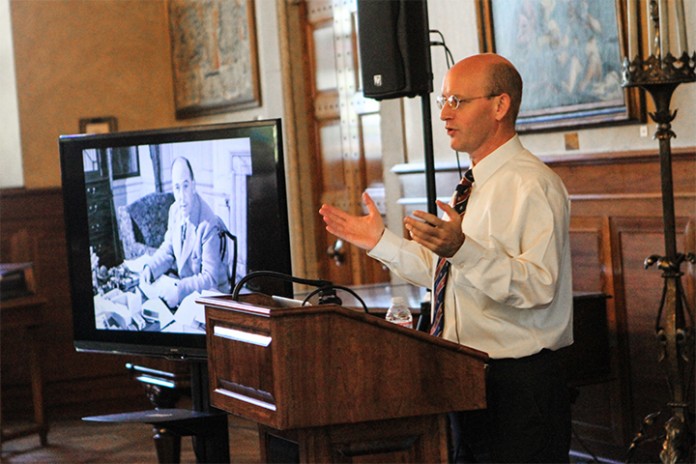
World-famous author C.S. Lewis structured his “Chronicles of Narnia” books using the imagery of the seven heavens of medieval imagination, Dr. Michael Ward told Baylor students and faculty in a lecture Monday afternoon in Armstrong-Browning Library.
Ward is a research fellow at Oxford University and a professor of apologetics at Houston Baptist University. He is the editor of “The Cambridge Companion to C.S. Lewis,” which features a chapter on “The Chronicles of Narnia” by former Baylor University professor Dr. Stephen Prickett. Ward is the author of “Planet Narnia: The Seven Heavens in the Imagination of C.S. Lewis,” in which Ward lays out his theory about the correlation between the Narnia books and the seven heavens.
“Planet Narnia” was also the inspiration for the BBC documentary, “The Narnia Code.”
Although “The Chronicles of Narnia” are some of the best known, most beloved books of the 20th century, Ward said, some critics such as J.R.R. Tolkien himself dismissed the series as a hodgepodge of too many different ideas and mythologies. Ward, however, argued that there is more going on in “The Chronicles of Narnia” than meets the eye.
According to Ward’s argument, the seven “Chronicles of Narnia” books match up with the seven heavens of medieval imagination. Prior to the Copernican revolution and the heliocentric model of the universe, medieval thought divided the sky into seven heavens: the moon, Mercury, Venus, the sun, Mars, Jupiter and Saturn. Ward said this cosmology is the background for much literature of the 16th century, such as Dante’s “Divine Comedy” and Chaucer’s “Canterbury Tales.”
Ward argued that C.S. Lewis planned for each book in “The Chronicles of Narnia” to be linked to one of the seven heavens. For example, he said, the plot and atmosphere of “The Lion, the Witch, and the Wardrobe” are connected to the planet Jupiter, which is classically linked to kingship. Meanwhile, Mars is the planet that predominates in “Prince Caspian,” as Mars was not only the planet of war but also of the forest — two elements that are important throughout the novel.
“I’m not presenting my theory just as a convenient grid or lens,” Ward said. “I’m saying this is his fundamental, underlying, imaginative logic for the books.”
Although Ward himself admitted that it was a big argument to assert that C.S. Lewis planned “The Chronicles of Narnia” to align with the seven heavens, he presented evidence to support his theory.
“He’s argued it very convincingly,” said Baylor University English professor Dr. Luke Taylor, “and so made a seminal discovery which is being hailed by not only C.S. Lewis scholars, but also a variety of other publications.”
Taylor said he hoped that Ward’s lecture on “The Chronicles of Narnia” would enable readers of the series to enjoy the books even more and enter into a richer imaginative world.
“The ‘Narnia’ chronicles are not just a mishmash,” Ward said. “They’re not a hodgepodge, as some people have thought. They’re not just silly little stories told for children, but actually quite the reverse. They are works of immensely sophisticated imagination and scholarship rendered in a fashion which doesn’t make them inaccessible to 7-year-old readers.”
Ward’s lecture was filled with tidbits that the average C.S. Lewis reader might not know. For example, Houston junior Casey Froehlich said she didn’t know before that Lewis’s full name is Clive Staples Lewis, that he went by the nickname Jack and that he was fascinated by astronomy.
“I wish I had gone to more lectures in my time here,” Froehlich said. “It’s an experience that I don’t think you get a lot in other stages of your life.”
Ward has also written another book about C.S. Lewis, titled “C.S. Lewis at Poets’ Corner,” which features a chapter written by Baylor professor Dr. Alan Jacobs and will be published later this year. Information about all of Ward’s books is available at https://www.planetnarnia.com/.




